 |
View this newsletter in your browser. |
 |
| Research Highlights | |
| People Spotlights | |
| Program Updates | |
| In the News |
| Calendar of Upcoming Events | |
| Feb. 14 |
Environmental Forum |
| "What Does a Science Adviser Actually Do?" Glenn Paulson, Science Adviser to United States Environmental Protection Agency Administrator Gina McCarthy » Read more ... |
|
| Feb. 20 |
Environmental Forum |
| "Colorado River Myths and Realities: The Coming Conflict" Brad Udall, Director of the Getches-Wilkinson Center for Natural Resources, Energy and the Environment, University of Colorado » Read more ... |
|
| Feb. 24 |
Energy Seminar |
| "The Rapidly Changing Economics of Solar PV Power: Solar Mini-Series (1 of 2) Stanford Woods Institute Senior Fellow Stefan Reichelstein (Business) » Read more ... |
|
| Feb. 26 |
Book Reading and Signing |
| "The Extreme Life of the Sea" Stanford Woods Institute Senior Fellow Steve Palumbi (Biology) » Read more ... |
|
| Feb. 27 |
Environmental Forum |
| "Climate, Economic Productivity and Human Conflict" Marshall Burke, graduate student in Agricultural and Resource Economics, University of California, Berkeley » Read more ... |
|
| Mar. 3 |
Energy Seminar |
| "Emerging High-Efficiency Low-Cost Solar Cell Technologies: Solar Mini-Series (2 of 2)" Michael D. McGehee, Associate Professor Materials Science and Engineering, Stanford » Read more ... |
|
| Mar. 5 |
Lecture |
| "Solving the Climate Puzzle" Stanford Woods Institute Senior Fellow Mark Jacobson (Civil and Environmental Engineering) discusses how to to make a nation-wide shift to all-renewable energy » Read more ... |
|
| Mar. 6 |
Environmental Forum |
| "Frontiers in Disease Ecology" Stanford Woods Institute Senior Fellow James Holland Jones (Anthropology) » Read more ... |
|
| Mar. 10 |
Energy Seminar |
| "Commercializing Wind, Photovoltaics, Lighting and Batteries: The Impact of Government Policies During the Past 25 Years" Cathy Zoi, Consulting Professor, Precourt Institute for Energy » Read more ... |
|
| Mar. 26-28 |
Natural Capital Project Annual Meeting and Training at Stanford |
| Learn more about this program's use of open-source software to incorporate natural capital information in decision-making. » Read more ... |
|
| May 5 |
Sustainability Summit (by invitation) |
| The Stanford Woods Institute will convene its inaugural Sustainability Summit for a cohort of 50 top CEOs, Chief Sustainability Officers, business leaders and Stanford faculty. This is an invitation-only program; highlights and related resources will be available in mid-May. | |
The State of the ScienceWith five words in his State of the Union speech President Obama signaled a renewed focus on science-driven policy: "Climate change is a fact." Of course, climate is only one of many scientific issues that national, state and local decision-makers must grapple with in the years ahead. That's why we are excited about our Rising Environmental Leaders Program (RELP), which helps Stanford postdoctoral scholars and graduate students build leadership and communications skills and features an intensive D.C. "boot camp." This year's cohort represents six of Stanford's seven schools and research interests ranging from the brain science behind environmental choices people make to the development of non-petroleum-based plastics. With RELP and other initiatives, the Stanford Woods Institute is working to increase the role of science in decision making to ensure better environmental policies and management practices. Sincerely, |
||
Debbie Drake Dunne |
Jeffrey R. Koseff |
Barton H. Thompson, Jr. |
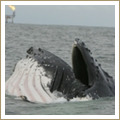
Whales Dodge Oil RigsWhen you are 50 feet long and weigh more than 40 tons, you need a lot of space to move around. Humpback whales, still recovering from hunting that wiped out as much as 90 percent of their global population, must maneuver around new obstacles caused by petrochemical extraction efforts, according to a study co-authored by Sara Maxwell, a Woods-affiliated postdoctoral scholar in biology. The study finds that humpback whales migrating among feeding and breeding grounds off the coast of Africa must dodge offshore oil and gas rigs, vessels in shipping lanes and the potentially harmful toxicants that accompany them. The study also made a surprising discovery about where some whales go to give birth. |
||

A Patch to Fight ParasitesIn rural Africa, childhood diseases take a huge toll, and current diagnostic methods require the use of expensive ultrasound equipment to determine whether parasitic worms are alive under the skin or inside lymph nodes. Woods-affiliated bioengineering professor Manu Prakash (Medicine) is developing an electromagnetic patch that noninvasively detects live parasitic worms in infected patients. Prakash and his co-investigator received a $100,000 Gates Foundation grant to test the idea. The first prototypes will be used to detect the worm that causes onchocerciasis, or "river blindness," which afflicts approximately 37 million people in Africa, Central and South America, and Yemen. Last year, Prakash received funding for related research from the Stanford Woods Institute's Environmental Venture Projects seed grants program. |
||

Ants in SpaceSeveral hundred ants have boldly gone where no ants have gone before: the International Space Station, high above the earth. They are there as part of an experiment designed by Woods-affiliated Biology Professor Deborah Gordon to determine how the ants, in near-zero gravity, adapt the innate algorithms that modulate their group behavior. The information that Gordon and her colleagues glean from the ants' behavior has the potential to help us understand how other groups, like search-and-rescue robots, respond to difficult situations. |
||
| For more research, see the Stanford Woods Institute quarterly Research Digest. | ||
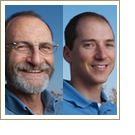
International Recognition for Climate ScientistsWithin days of each other, two Stanford Woods Institute senior fellows who work to enhance our understanding of climate change received prestigious international honors. Chris Field (Biology, Earth Sciences, FSI), head of the Carnegie Institution for Science Department of Global Ecology, was awarded the 400,000-euro ($543,000) BBVA Foundation Frontiers of Knowledge Award. David Lobell (Earth Sciences, FSI), associate director of the Center on Food Security and the Environment, was named to Foreign Policy magazine's list of 100 "Leading Global Thinkers." In December, Field was named among the "Five to Watch" in 2014 by the journal Nature for his work as co-chair of a U.N. Intergovernmental Panel on Climate Change working group that will release a major report in March. |
||
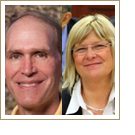
New Woods FacultyThe new year brought new faces to Woods. Beth Kerttula, who until recently was the Democratic leader of the Alaska State House of Representatives, joined the Center for Ocean Solutions as a Visiting Fellow. In addition to her 15 years as an elected official,
she brings expertise in ocean and coastal issues to Stanford, where she will expand the center's capacity on marine and coastal ecosystem policy. Robert Jackson, the Kevin and
Michelle Douglas Professor of Environment and Energy, joined Woods as a senior fellow. Jackson and his lab team do basic and applied research on carbon, water
and nutrient cycling, plant and microbial ecology, and global change. His goal is to build predictive, scientific frameworks that help guide policy solutions
for global warming and other environmental problems. |
||
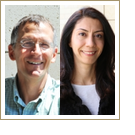
New Woods StaffWoods recently welcomed new staff and made a leadership appointment. As the new executive director of Water in the West, Leon Szeptycki is tasked with fostering interdisciplinary research and convening leaders from a broad spectrum of
interests to address one of the American West's greatest challenges. Szeptycki is an attorney who specializes in water quality, water use and watershed
restoration. As external affairs adviser in Washington,
D.C., Lea Rosenbohm will play a lead role in helping to magnify the impact of Stanford's environmental research and connecting the Woods community to D.C.
policymakers and other key national and international stakeholders. Rosenbohm has extensive experience managing environmental policy programs relating to
climate change, energy security and clean air. As director of urban water policy at Water in the West, Newsha Ajami directs research on integrative and multi-disciplinary urban water management and policy and leads the water/energy nexus program. She is a hydrologist specializing in sustainable water resource management, flood and water supply forecasting, and advancing uncertainty
assessment techniques impacting hydrological predictions. |
||
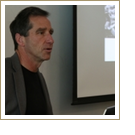
Seeing Value in WasteWhat if recycling were a global for-profit business with nearly unlimited growth potential? Actually, it is. That was the message Mike Biddle, president and founder of MBA Polymers, Inc., brought to campus recently during a Stanford Woods Institute Environmental Forum. Around the world, people dispose of 500 billion pounds of plastic every year. Unlike with steel, plastic resists easy recycling because it is notoriously difficult to sort by type. As a result, tons of plastic, some of it 10 times more valuable than steel, goes to waste, according to Biddle. |
||

DNA Provides Clues to Mysteries of the DeepScientists at the Center for Ocean Solutions are helping to usher in a new era of ocean monitoring using tools based on cutting-edge DNA sequencing technology. Their research, which has received funding from the Stanford Woods Institute's Environmental Venture Projects seed grant program, could help track the presence and abundance of fishes and other ocean wildlife - a critical aspect of understanding marine ecosystems and applying science-based policy. Traditional methods of ocean monitoring can be time-consuming, expensive and error-prone because they often involve boat-based scuba divers counting individual animals. |
||

Thwarting Ocean Poachers? There's an App for ThatYou're walking along the pier on a balmy summer night, enjoying the breeze. Suddenly you notice someone hauling up a bucket of lobsters, even though lobster season doesn't start for another week. What do you do? Thanks to a new app, you can use your smartphone to report the poacher on the spot. MPA Guardian, so named because it promotes citizen guardianship of specialized marine protected areas, is the brainchild of Shah Selbe, a former Stanford graduate student affiliated with the Center for Ocean Solutions. |
||

Mel Lane Grants AwardeesThe Stanford Woods Institute recently awarded grants to Stanford student projects that hold the promise of bringing solar irrigation to poor farmers in India and using 3D printers to make parts for an affordable drinking water chlorinator, among other bold objectives. The Mel Lane Student Grants Program provides $500 to $3,000 per project for student-driven-and- managed environmental initiatives that make a measurable impact on an issue through action or applied research. The next proposal submission deadline is Feb. 17. |
||
| Selected media coverage of the Stanford Woods Institute and its fellows, affiliated scholars and supported research |
||
Forget 'Shark Week': They Aren't the Only Fish in the SeaLos Angeles Times, Feb. 3 |
||
Viewpoints: Environmental Water Market Would Help the Losers in This DroughtSacramento Bee, Feb. 2 |
||
The Secrets of the Jumbo SquidThe Atlantic, Jan. 31 |
||
Drought a Fact of California Life; Planning Can Ease ImpactSan Francisco Chronicle, Jan. 24 |
||
How Climate Change Is Causing Chaos in the Animal KingdomThe Daily Beast/Newsweek, Jan. 23 |
||
If You See Something, Say SomethingThe New York Times, Jan. 17 |
||
Explosion in Extreme Drought in CaliforniaThe Washington Post, Jan. 16 |
||
Efforts to Curb Unbridled Grown That's Killing the PlanetSan Francisco Chronicle, Jan. 4 |
||
Plan Calls for Renewable Energy to Power N.Y State and MoreVoice of America, Dec. 31 |
||
Are Antibacterial Soaps Really Better?Popular Mechanics, Dec. 20 |
||
Poll: Americans See Impact of Global WarmingUSA Today, Dec. 20 |
||
Tracking the Secret Lives of Great White SharksWired, Dec. 19 |
||
Palm Oil Proving Unhealthy for People, Environment San Francisco Chronicle, Dec. 13 |
||
| Find Us on the Web |
Read more News and Media Coverage from the Stanford Woods Institute's fellows and affiliated faculty, including fellows with our Leopold Leadership Program. Subscribe to our other online publications. Submissions Past issues can be found online. For more information about the Stanford Woods Institute, visit our website or email us at environment@stanford.edu. |